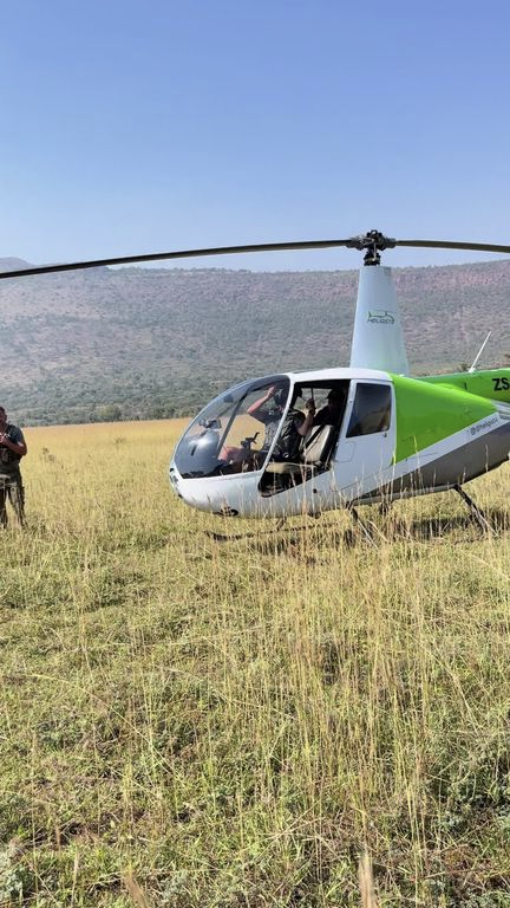TREATING AN INJURED RHINO
With less than 16,000 white rhinos remaining in Africa today, every individual counts in the fight to save the species. Wild Tomorrow was very proud to join a team of vets, students, helicopter pilots, and rangers, in aiding an injured rhino who had a very sore (and potentially life-threatening) wound on her rump.
Read below to hear the whole story!
Wild Tomorrow’s Director Louis Buckworth (center right) was part of the rescue team.
It’s not often that we’re asked for urgent financial assistance. So, when the call came in from Grant Tracy at TD Game Capture, one of our wildlife conservation partners in KwaZulu-Natal South Africa, we knew it was something very important.
A female white rhino with a large wound on her rump needed immediate veterinary care. Together with Wild Wonderful World, we were asked to cover the cost of the helicopter required for the movement and immobilization of the rhino into a safe area. With currently less than 16,000 white rhinos remaining in Africa, every individual matters, and we immediately said yes.
We were thrilled to assist and help African Wildlife Vets, who spearheaded the mission. As @africanwildlifevets explained, earlier this year in March, Dr. Chris Smith and Jana Meyer of Hope for Helicopter Wildlife Services were called to assist the injured rhino. The vets suspected that her painful-looking wound was an infection caused by a tick bite, but the intervention was needed to make sure she was not a victim of human-caused violence (in other words, to make sure it wasn’t a bullet wound from a poaching attempt).
Three weeks after the initial treatment, Dr. Smith and helicopter pilot Jason Fischer of Heligistix needed to return for follow-up treatment. Aboard the helicopter, which was a five-hour return journey, was our very own Wild Tomorrow Board Member, Louis Buckworth. He was greeted on arrival by three truckloads of veterinary students from Adelaide University, which happens to be Louis's hometown. A beautiful coincidence.
Once at the scene, the vets tended to the rhino. Dr. Smith cleaned the wound again, removed maggots, and gave her more antibiotics and pain medication. A tracking collar was also attached to the injured rhino to allow the monitoring team to more easily look over her and assess her condition over the coming months and years - all in just twenty minutes! This speedy intervention shows the importance of having the right group of people working together to assist and support wildlife.
“Witnessing more than a dozen helping human hands all aiding a single rhino was very moving," said Wild Tomorrow's Board Director, Louis Buckworth. "It was a remarkable moment, giving us hope that together, all hands on deck, we can make a difference".
Overall, the prognosis for this lucky female rhino is good, with a full recovery expected.
Help us fund emergency wildlife operations like this rhino rescue by donating to our Vet Care Fund. In wildlife emergencies, there is no time to fundraise, and having funds ready and available for wildlife in need can literally save lives, allowing care teams on the ground to spring into action in the moment of need.
We are very grateful to the team at African Wildlife Vets and all the partners involved for the work they do for rhinos (and other threatened species), and to our community of donors who make urgent help for wildlife possible in these crucial moments. Thank you!
In collaboration with: @wildwonderful_world | @theaspinallfoundation | @heligistix | @hope_for_wildlife_helicopter | @chrissmithsa92 | @gaitjansterk | @chrishobkirk



